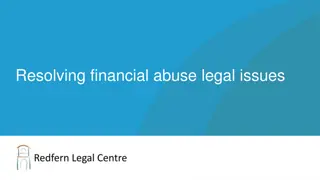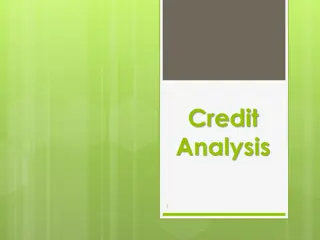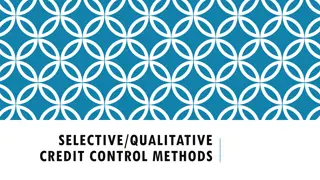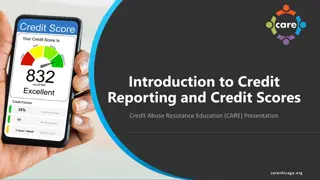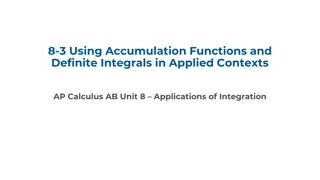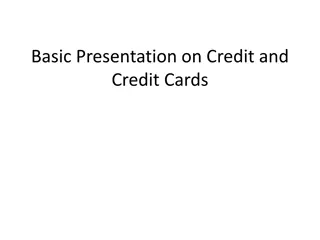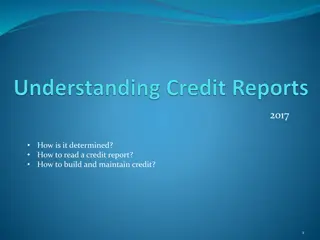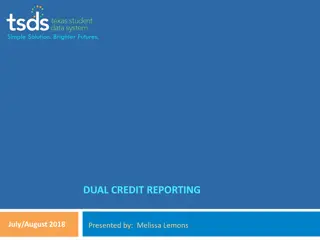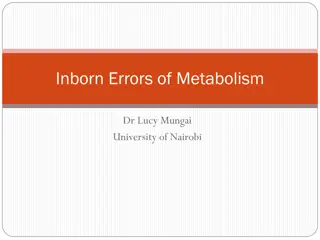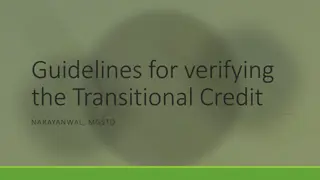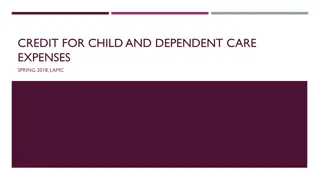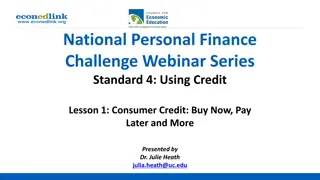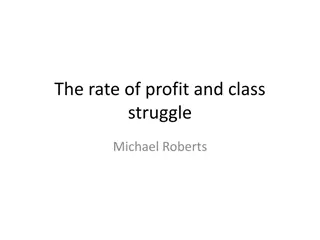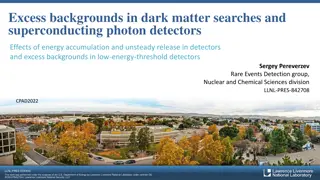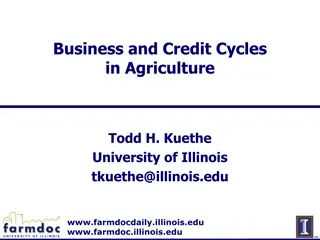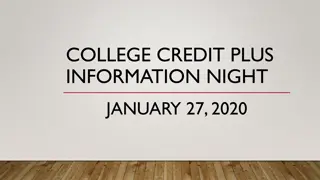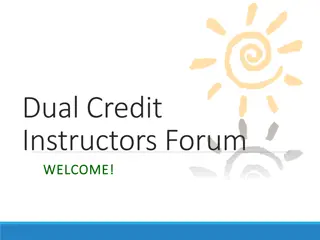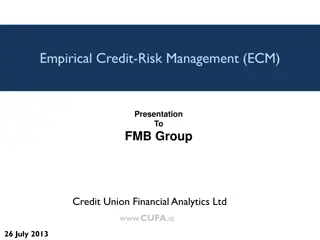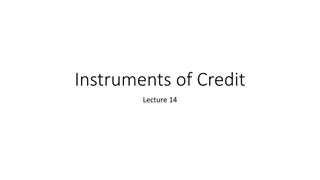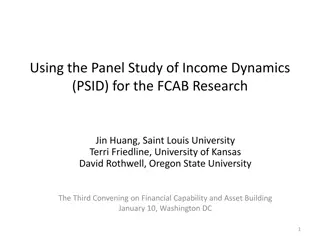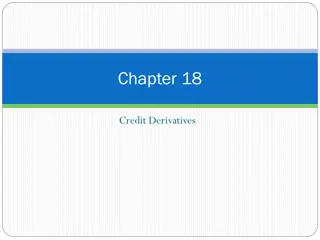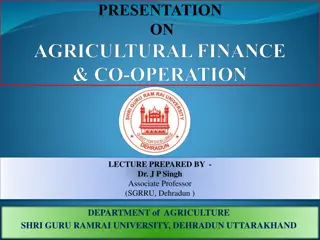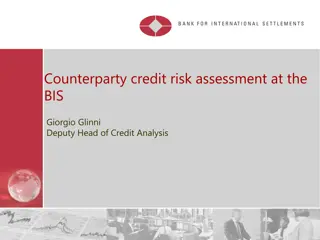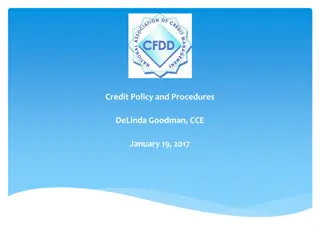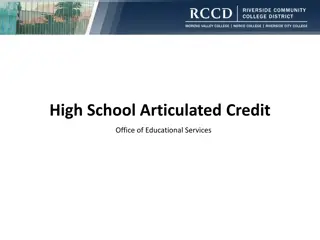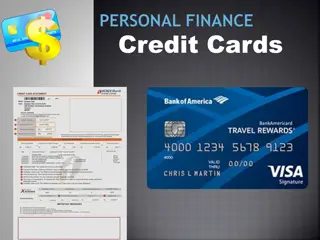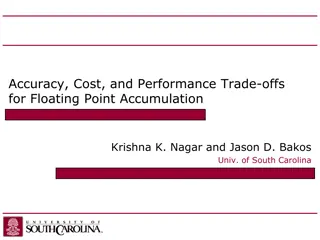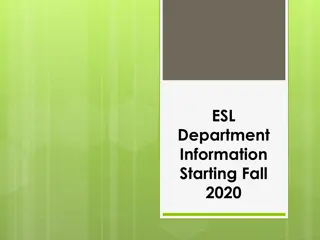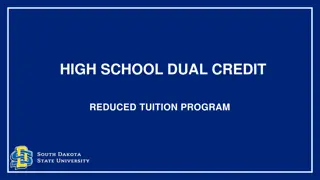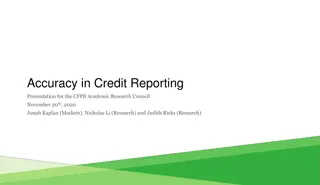Impacts of Thermosphere Contraction on Debris Accumulation and Orbital Capacity
Explore the effects of thermosphere contraction on debris accumulation and orbital capacity, as discussed in a workshop at Politecnico di Milano. Satellite observations reveal increasing COx levels, impacting the upper atmosphere's chemistry. The concern for space debris management is highlighted, e
1 views • 29 slides
Dual Credit Options at Champion High School
Champion High School offers Advanced Placement (AP) and Dual Credit programs in partnership with various institutions like Northwest Vista College, Angelo State University, UT On-Ramps, and Tarleton Today. Students can earn college credit by meeting testing requirements, with some classes being free
1 views • 14 slides
Resolving Financial Abuse: Legal Issues and Consumer Credit Law
Learn about resolving legal issues related to financial abuse, consumer credit law, crafting financial hardship requests, negotiating with creditors, getting specialist legal advice, and testing your knowledge on financial matters. Gain insights into consumer credit law, the National Consumer Credit
0 views • 67 slides
Understanding Credit Analysis for Farmers and Fishers
Credit analysis is crucial for farmers and fishers to access the right amount of credit at the right time. Economic feasibility tests such as returns on investment, repayment capacity, and risk-bearing ability are essential factors to evaluate credit worthiness. The 3Rs of credit - returns, repaymen
0 views • 30 slides
Understanding Credit Reports and Scores: A Comprehensive Overview
Explore the importance of credit reports and scores in financial empowerment through modules on reviewing credit reports, understanding credit scores, and mastering credit basics. Learn how good credit can impact your ability to obtain loans, credit cards, secure rentals, insurance coverage, and emp
3 views • 35 slides
Mastering Credit and Debt in Head Start Program
Understand the complexities of credit and debt to make informed financial decisions. Learn about different types of credit, pros and cons of credit cards, debit cards, prepaid cards, and secured credit cards. Gain insights on how to manage your finances effectively and build a strong credit history
0 views • 29 slides
Qualitative Credit Control Methods Explained
Selective/Qualitative credit control methods involve regulating the quality and direction of credit flows by implementing controls such as ceilings on credit, margin requirements, discriminatory interest rates, directives, direct action, and moral suasion. These methods are used by central banks lik
0 views • 7 slides
Understanding Credit Reporting and Credit Scores in CARE Presentation
Explore the essential concepts of credit reporting and credit scores in the context of Credit Abuse Resistance Education (CARE). Learn about credit history, its impact on financial decisions, ways to establish credit, the significance of credit reports, and how credit behaviors affect one's financia
0 views • 21 slides
Understanding Accumulation Problems and Definite Integrals in Applied Calculus
Explore the interpretation of definite integrals in accumulation problems, where rates of change are accumulated over time. Learn how to solve accumulation problems using definite integrals and avoid common mistakes by understanding when to use initial conditions. Discover the relation between deriv
0 views • 9 slides
Understanding Credit Cards: A Beginner's Guide
Explore the basics of credit cards, including how they work, differences from debit and prepaid cards, obtaining one, and building credit. Learn about credit character, revolving credit, and tips for getting approved for a credit card. Discover the importance of good credit and income when applying
0 views • 20 slides
Understanding Credit Reports and Building Credit in 2017
Understanding credit reports is essential for financial well-being. A credit report is a record of your payment history on loans and credit cards. This report is used to calculate your credit score, which determines your creditworthiness. Building and maintaining credit involves making payments on t
5 views • 22 slides
Dual Credit Reporting Guidelines for College Courses
Dual Credit Reporting provides definitions, guidelines, and validation rules for reporting college courses that allow students to earn both high school and college credit. Key elements covered include credit indicators, college credit hours, course sequencing, and validation rules to avoid overrepor
0 views • 6 slides
Understanding Inborn Errors of Metabolism and Metabolic Disorders
Inborn Errors of Metabolism (IEM) are genetic disorders that disrupt metabolic pathways, leading to substrate accumulation or product deficiency. These disorders can be classified based on toxic accumulation, protein metabolism, carbohydrate intolerance, lysosomal storage issues, energy production d
0 views • 29 slides
Guidelines for Verifying Transitional Credit and Important Authorities' Orders
The guidelines for verifying transitional credit include directives from the Hon'ble Supreme Court, the opening of a common portal for filing forms, the verification process timeline, and the reflection of approved transitional credit in the Electronic Credit Ledger. Relevant orders and circulars fr
1 views • 19 slides
Understanding Child and Dependent Care Expenses Credit
The Child and Dependent Care Expenses Credit allows taxpayers to reduce their tax liability by a portion of expenses incurred for caring for qualifying persons. Qualifying persons include children under 13, incapacitated spouses or dependents, and certain criteria must be met to claim the credit. Th
8 views • 10 slides
The Case for Private Credit Investments in the Global Market
Private credit investments are gaining significance in the global market, offering innovative financing solutions outside traditional avenues like public markets. With a focus on innovation, independence, and integrity, private credit investments cater to diverse sectors such as real estate, natural
1 views • 9 slides
Comments on Draft National Credit Amendment Bill, 2018 Review by Professional Accountants
Detailed analysis and recommendations by the South African Institute of Professional Accountants on key sections of the Draft National Credit Amendment Bill, 2018, addressing issues related to tribunal functions, reporting time frames, debt intervention, and interest accumulation on credit agreement
0 views • 16 slides
Take Control of Your Credit Report: A Comprehensive Guide
Learn how to take control of your credit report, understand why it matters, spot credit repair scams, and fix mistakes. Discover why your credit history is important and how to get your free credit reports. Explore the significance of your credit score, review your credit reports, and know how to ha
0 views • 16 slides
Understanding Consumer Credit: Buy Now, Pay Later and More
In this webinar series, Dr. Julie Heath discusses the importance of consumer credit and the implications of buying on credit. Through real-life scenarios involving high school seniors and college students facing financial decisions, students are encouraged to weigh the pros and cons of using credit.
0 views • 15 slides
Understanding the Law of Profitability in Capitalist Accumulation
Explore the relationship between the rate of profit, class struggle, and capitalist accumulation. From the general law of accumulation to the law of profitability, examine how displacing labor affects the average rate of profit and learn about Marx's law of profitability. Discover the evidence from
0 views • 17 slides
Dark Side of the Afterglow: Complications in Dark Matter and Rare Events Searches
Exploring the challenges in detecting dark matter and rare events due to energy accumulation, excitation clustering, and avalanche relaxation events. Discusses issues such as low-energy background, ionization load on detectors, dual-phase detectors, universal scenarios of energy accumulation, and en
0 views • 15 slides
Insights into Excess Backgrounds in Dark Matter Searches and Energy Accumulation Effects in Detectors
Explore the impact of excess backgrounds in dark matter searches, energy accumulation, and unsteady releases in detectors. Delve into the implications on low-energy-threshold detectors and the emergence of complex effects in various detector types due to energy accumulation and delayed releases.
3 views • 23 slides
Investigation of Self-Organized Criticality Dynamics in Low Energy Threshold Ionization Detectors
Exploring the effects of energy accumulation in materials in detectors for coherent neutrino scatter, dark matter searches, and superconducting sensors and qubits. Focus on condensed matter effects, responsivity, background, and a hypothesized universal condensed matter mechanism. Touches on energy
0 views • 16 slides
Understanding Business and Credit Cycles in Agriculture
This research delves into the relationship between business and credit cycles in agriculture, focusing on the impact on operating margins, farmland prices, and lending practices. It explores the linkage between asset values and credit, highlighting the significance of farmland as collateral in farm
0 views • 23 slides
College Credit Plus Information Night - Benefits, Challenges, and Considerations
College Credit Plus (CCP) offers students in grades 7-12 the opportunity to earn high school and college credit simultaneously. This program has advantages such as cost-free college credit, textbooks paid for by Padua, and the ability to graduate early. However, potential challenges include impacts
0 views • 16 slides
Enhancing Dual Credit Programs for College-Ready Students
Explore strategies for delivering effective dual credit programs designed to increase graduation rates, provide alternatives for credit accumulation, and transition students to post-secondary education. Discover insights on remote delivery, student engagement, and educator roles to optimize the dual
0 views • 12 slides
Empirical Credit Risk Management at FMB Group Credit Union
Empirical Credit-Risk Management (ECM) presentation to FMB Group Credit Union by Financial Analytics Ltd discusses the background, traditional forecasting methods, income and risk recognition, provisioning approaches, and benefits for credit unions. ECM offers expert retail credit risk management th
0 views • 25 slides
Understanding Credit Instruments and Negotiable Instruments
Credit instruments play a crucial role in modern business by facilitating the transfer of money between lenders and borrowers. These instruments, such as Payroll Credit, Book Credit, and Documentary Credit, come in various forms like oral agreements and written documents. Negotiable instruments, on
0 views • 11 slides
Exploring Asset Accumulation and Financial Capability with PSID Data
Explore the Panel Study of Income Dynamics (PSID) data for research on financial capability and asset building. PSID is a longitudinal survey tracking households since 1968, covering various topics like wealth, savings, pensions, and more. The data allows for studying intergenerational dynamics, wea
0 views • 5 slides
Understanding Credit Derivatives and Managing Credit Risk
This chapter delves into credit derivatives, exploring their purpose, types such as credit default swaps and total return swaps, and the development of the market over the years. It discusses credit risk, problems associated with it, methods for estimating credit risk, and the role of credit derivat
0 views • 35 slides
Principles of Credit in Agricultural Financing
Explore the key principles guiding credit in agricultural financing as outlined by Dr. J.P. Singh, including the Five Cs of Credit and the Seven Ps of Credit. Learn about the importance of factors such as productive purpose, productivity, and proper utilization in ensuring successful lending practic
0 views • 7 slides
Counterparty Credit Risk Assessment at the BIS: Approaches and Factors to Consider
The presentation discusses various approaches for assessing counterparty credit risk at the BIS, including full reliance on external ratings, internal risk assessment, and combinations of both. Factors such as credit risk exposures, regulatory requirements, organizational impact, skillset availabili
0 views • 36 slides
Market Credit Working Group Update to Wholesale Market Subcommittee
The Market Credit Working Group provided updates to the Wholesale Market Subcommittee regarding NPRR review, focusing on NPRR 1088 which addresses credit impacts related to the elimination of RFAF and DFAF applications to prior and ongoing market positions. The discussion revolved around ERCOT credi
0 views • 8 slides
Understanding the Importance of Credit Policies in Business Operations
A credit policy/manual serves as a comprehensive guide detailing rules, regulations, and procedures within a company. It helps new employees understand the company's credit processes and establishes clear guidelines for decision-making. Without a credit policy, conflicts may arise in approving credi
0 views • 9 slides
Understanding High School Articulated Credit: Benefits, Transferability & Responsibilities
High school articulated credit allows students to earn college credit by aligning high school CTE classes with college-level courses. This collaboration between high school teachers and college professors can save students time and money by reducing the need to repeat coursework in college. Students
0 views • 8 slides
All About Credit Cards: A Comprehensive Guide
Explore the world of credit cards, from understanding the basics to managing credit wisely. Delve into the advantages and disadvantages, learn about different types of credit cards, and discover how to use credit cards responsibly. Discuss whether high school students, college students, and adults s
0 views • 36 slides
Trade-offs in Floating Point Accumulation: Balancing Accuracy, Cost, and Performance
When designing floating point accumulation systems, achieving high throughput and accuracy presents a challenging trade-off. Inconsistent accuracy due to data dependencies can lead to significant errors in results. Strategies such as compensated summation or using extended precision adders can help
0 views • 11 slides
Comprehensive Information on ESL Department's Fall 2020 Offerings
Explore ESL class options starting Fall 2020, including credit vs. non-credit courses, new course offerings, course numbering system, differences between credit and non-credit classes, and more. Discover details on certificates, financial aid, graduation, and transfer information, with insights on c
0 views • 12 slides
High School Dual Credit Reduced Tuition Program Information
The High School Dual Credit Reduced Tuition Program allows eligible high school juniors and seniors in South Dakota to take General Education courses at a reduced tuition rate of $48.33 per credit. Students can fulfill high school requirements while earning college credit, jumpstart their post-secon
0 views • 31 slides
Evolution of Credit Reporting and Consumer Awareness
Credit access is crucial for consumers, yet inaccurate credit reporting can have significant impacts on credit scores. Studies show that errors in credit reports are common, with many consumers disputing inaccurate information. The regulatory landscape has evolved since the 2012 FTC study, with incr
0 views • 10 slides


